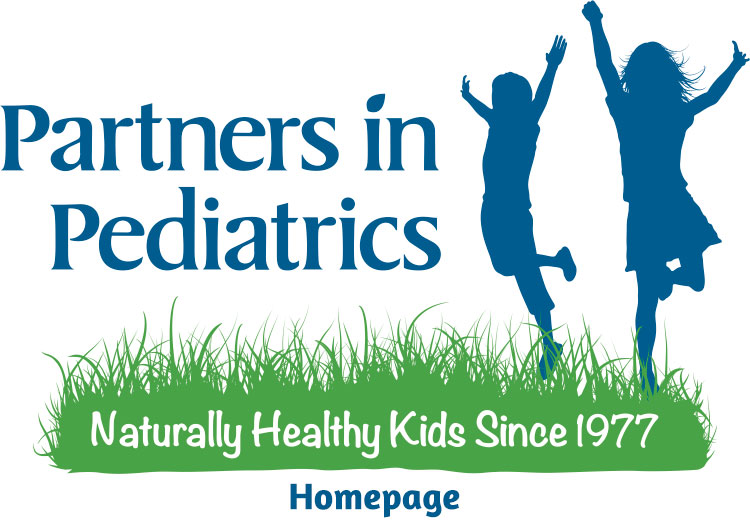October marks the start of flu season and to get ahead of the runny noses, coughs, and sore throats, we took (literally) a chapter from our Naturally Healthy Kids handbook all about the flu. When you have a question or concern, our handbook can provide a wonderful starting point for finding answers.
Throughout this blog, we will break down influenza, including its symptoms, treatments, and preventive measures. Our goal is to provide our parents and caregivers reliable information and sensible strategies for managing the flu for your family. Although typical “flu season” is in winter months, it can vary from year to year & in different areas of the country. Here at PIP, we are already seeing cases of Flu A this month!
As always, do not hesitate contacting your integrative pediatric care provider here at Partners in Pediatrics if you have any questions or your child’s symptoms do not improve.
What is Influenza?
Influenza (“the flu”) is a viral infection that affects the nose, throat, and lungs. It occurs every year, primarily in December through March. The main symptoms are stuffy nose, sore throat, cough, fatigue, headache, and muscle aches. For most children, influenza is very much like a typical viral infection. However, the flu can be more life threatening for the elderly and those with underlying health problems, but also for CHILDREN LESS THAN 5 years of age.
Causes
Influenza is caused by the influenza virus. In any given year, there are approximately 3 or 4 main influenza viral strains that account for the majority of the influenza that we see. In addition, a dozen or more viruses can cause “influenza-like” symptoms. This is why we often refer to it as the “flu,” because it is difficult to know for certain if the virus is influenza or another virus, although influenza usually causes a more miserable illness.
Because all of these virus groups cause similar symptoms and the treatment for all of them is the same, we will discuss them as if they were a single disease—“the flu.”
These viruses enter the body through the respiratory tract, primarily the nose or mouth, and immediately invade these membranes. These tissues become inflamed and swollen, and then mucous is produced. The virus easily enters the bloodstream and can be circulated throughout the rest of the body. That is why we often hear, “My whole body aches!”
Significant influenza epidemics occur every 2 or 3 years, with milder versions in between. There is never a year that passes without an “influenza season.”
Expected Course
Children respond to the flu in a variety of ways. In infants, the illness can be severe, since babies have difficulty localizing the infection to one location, such as the throat. These children can be restless, eat and drink less, and have significant fever and lethargy.
Older children and adolescents may have very mild symptoms much like a cold, with low-grade fever (100 to 102 degrees), a dry and hacking cough, headache, and muscle aches. With minimal treatment they are often better within just a few days.
Some children may have a more severe syndrome. They may have a much higher fever (102 to 106 degrees), extreme irritability when awake, increased lethargy, a very sore throat, a painful and unremitting cough, decreased appetite, sleep disruption, and severe muscle aches. These children may be bedridden for up to a week before some activity is resumed. Even then, it may take an additional week or two for full recovery to take place.
In the most severe cases, some children will require evaluation beyond your health-care provider and a visit to the ER for further diagnostic evaluation and possibly IV fluids. Hospitalization is less likely. Children with severe flu may experience complications such as pneumonia, bronchitis, and dehydration, although these are rare.
Healthy children less than 2 years of age and children with underlying health problems, such as asthma and diabetes, are especially prone to more severe versions of the flu. For these children an influenza vaccine each year is highly recommended.
Contagiousness / Immunity
Influenza is highly contagious. It is transmitted in the air by a cough or sneeze. It is also passed along in infected secretions from an ill child. It enters the respiratory tract through the nose, mouth, and/or eye.
Because there are so many different strains of virus that can cause the flu, it is possible to have a flu syndrome more than once in a single season. Having one episode of “the flu” confers no protection against another “flu-like” virus.
Your child is contagious about 2 days before the onset of symptoms and will continue to be contagious at least until the fever is gone and other symptoms begin to resolve. It is impossible to know exactly when the virus has made its final exit from your child’s body; however, your child can generally return to school or daycare when the fever is gone for at least 24 hours and symptoms are mild enough to resume normal activity.
Home Care
The treatment of influenza depends on your child’s age, severity of symptoms, and any other underlying illnesses your child may have. Our goals are to provide comfort and to support your child’s own immune system to fight the infection. Treatment is similar to that for other viral respiratory infections.
1. Fever. Use acetaminophen or ibuprofen. See “OTC Medication Recommendations and Dosages” section. When your child has a fever but is comfortable, it is fine to watch him carefully without administering these medications, to allow the body’s own natural healing mechanism to attack the virus.
If the presence of the fever causes your child any pain or discomfort, he/she should be treated with pain-relieving medication (acetaminophen or ibuprofen). See “Fever” section for further guidance on fever management.
Important Note: ASPIRIN AND ALL ASPIRIN CONTAINING PRODUCTS SHOULD NEVER BE GIVEN TO CHILDREN WITH SUSPECTED FLU as it can lead to more serious complications.
2. Aches. Muscle aches, especially in older children, can be very debilitating. Here again, ibuprofen or acetaminophen can help. Gentle massage may also relieve some muscle tightness and provide relief.
3. Cough. See “Cough” section. The primary goal is to provide relief so that your child can sleep. This may require the use of a cough suppressant. During the day, we discourage cough suppressants so that mucous can be mobilized and coughed out of the respiratory tract.
Elevating the head of the bed and running a vaporizer during sleep are helpful relief measures for the cough. Should your child need a cough suppressant in order to sleep, see “OTC Medication Recommendations and Dosages” section.
4. Sore throat. See “Throat” section for a more complete discussion.
5. Congestion. Use saline nose drops made of 1/2 teaspoon of salt and 1 cup of water or commercially available saline drops (for example, Ocean®). Put 2 drops in each nostril and have your child blow his nose or you may suction away the mucous. Repeat as needed 3 to 4 times per day.
If nasal congestion significantly interferes with eating or sleeping and saline nose drops are not sufficient, you may consider using OTC phenylephrine nose drops in a strength of 1/8% or 1/4%. You may administer 1 to 2 drops in each nostril as needed to support eating and sleeping for a maximum of 3 doses per day, for a maximum of 7 days. (Use for longer periods can result in nasal membrane dependency.) Either cool-mist or warm-mist humidifiers or vaporizers can be helpful.
6. Hydration. We recommend ample clear liquids to maintain hydration and thin the mucous so that it can be expelled more easily from the respiratory tract. Milk and other dairy products tend to produce mucous, which further worsens the situation. Popsicles, 1/2 strength Gatorade®, soups, diluted juices, and warm teas are soothing. These fluids may also help with constipation caused by decreased oral intake. See “Dehydration” section.
7. Nutrition. A diet of soft foods, easy to digest and low in fat is best. Fruits, cereal, and bland solids are fine.
8. Eliminate cigarette smoke.
Integrated Therapies
AROMATHERAPY
- Ravensara aromatica essential oil may have a preventive effect for influenza when a child has a significant exposure or when used early in the illness. Add 2 to 5 drops of oil to a warm bath and allow your child to soak for a comfortable period of time. You may also add 2 to 3 drops to a tablespoon of olive oil and rub into the bottoms of the feet, the chest, and back. It may also be used as a steam inhalation.
- An aromatherapy bath or massage with the essential oils of eucalyptus radiata and/or lavender can soothe and relax your child’s anxiety and restlessness. Add 2 to 3 drops of oil to a warm bath and allow your child to soak for a comfortable period of time.
HERBAL REMEDIES
- Echinacea can be used to support the immune system in helping to resolve a viral infection. For dosing, follow the package labeling accurately.
- Horehound may be very effective in reducing mucous production and thus improve a wet cough. It may help in the recuperative phase of bronchitis, if there is a significant amount of mucous production. For dosing, follow the package labeling accurately.
- Valerian root is a mild herbal sedative that may offer some help in easing a child with significant restlessness. Valerian root may be most useful at bedtime. For dosing, follow the package labeling accurately.
- Herbal teas may offer some soothing relief of cold symptoms (especially a sore throat) and also provide a good source of fluids. Herb teas made from chamomile or mint as well as a variety of blended herbal teas can be brewed according to package directions, sweetened to taste, and offered frequently throughout the day.
HOMEOPATHIC REMEDIES
- A homeopathic remedy designed to support the defense system in viral infections may be useful. It can be taken 3 to 6 times daily when the virus is active (for example, fever, lethargy, etc.). (General Support 1)
- A homeopathic remedy designed to relieve some of the discomforts associated with infections (for example, fever, body aches, chills and fatigue) may be useful. It can be taken 3 to 6 times daily when the virus is active (for example, fever, lethargy, etc.). (General Support 3)
- A homeopathic remedy designed to minimize nasal congestion and mucous, especially when associated with respiratory infections, may be useful. It can be taken 2 to 3 times daily while there is nasal congestion. (Respiratory 3)
BACH FLOWER REMEDIES
- Rescue Remedy™ may be of use if your child is uncomfortable from the illness, stress, or anxiety. You may use 2 drops every 10 minutes to every few hours to calm restlessness as needed.
- Ten drops of Rescue Remedy™ added to a lukewarm bath is often very effective at relieving many of the symptoms of the flu.
NUTRITION AND SUPPLEMENTS
- Vitamin A
- Vitamin C
- Zinc
DIETARY GUIDELINES
- It is best to avoid all dairy products and citrus fruits because they may increase or thicken respiratory mucous.
- Reduce or eliminate fried and fatty foods and sugar-sweetened foods from the diet.
- Eliminate alcohol and caffeine intake.
- Warm foods such as soups, warm cooked grains (for example, oatmeal), and teas should be given.
- Your child may not feel well enough to eat, so don’t force food. Instead, make sure that he/she continues a good intake of fluids and drinks extra water to ensure good hydration.
You may use the following table as a general guideline for water in addition to normal fluid intake:
AGE OUNCES OF WATER PER DAY
- 2 to 5 years old 12 to 18 ounces
- 5 to 12 years old 18 to 24 ounces
- 13 and up 32 to 48 ounces
When to Call Your Health-Care Provider
Call immediately if any of the following occur:
- Your child becomes progressively restless or agitated in spite of adequate pain management.
- Your child becomes progressively more lethargic and difficult to arouse.
- Your child complains of a stiff neck, blurred vision, or cannot walk.
- Your child exhibits signs of dehydration. See “Dehydration” section.
- Your child coughs up blood.
- Your child develops a fever greater than 106 degrees. See “Fever” section.
- Your child complains of severe chest or abdominal pain not relieved within an hour.
- Shortness of breath or rapid breathing rate (over 60 breaths per minute in an infant or over 40 breaths per minute in children over the age of 2 years), especially in the absence of fever.
- Your young child or infant has significant difficulty breathing and/or croup-like stridor when taking a breath.
Call within 24 hours if:
- An earache develops.
- Fever lasts more than four days.
- Difficulty with breathing is gradually worsening.
- Your child has not been able to return to school for over a week.
- Your child has a severe sore throat and has been exposed to strep.
Prevention
Influenza viruses are transmitted through the air and through oral and nasal secretions. It is impossible to prevent every contact, especially in public places. Hand-washing is the key to spreading the virus. Caregivers and parents should wash their hands thoroughly after handling a sick child and/or objects touched by that child. The virus may survive on inanimate surfaces for several hours and so can be passed along on contaminated toys, books, and clothing.
It is also important to teach your children to wash their hands regularly as well as to cover their nose and mouth when sneezing and coughing. Avoid children who are known to be ill. This is especially true if your child is prone to infections.
If your child is prone to emotional stress, seek out factors in his environment that act as triggers for illness and work to lessen or minimize them.
Finally, an influenza vaccine, or the “flu shot,” is available. This shot is available in the fall every year and is specific for only the influenza virus. It does not protect against any of the other viruses that cause “flu-like” illnesses. The flu vaccine confers at least partial immunity (helping us avoid ER visits/hospitalization or life threatening illness) to FOUR flu versions predicted to hit our area each winter. By contrast getting the flu only protects one from getting that same strain again – so it is still advised to get the flu vaccine for the best protection.
All children, especially children with underlying issues (asthma, premature infants, children on oxygen, diabetics, cystic fibrosis, etc.), are encouraged to receive the flu vaccine yearly. In otherwise normal children, the influenza vaccine is optional and a parental choice. The “flu shot” is a “killed virus” vaccine, and therefore cannot give your child the flu. Rarely, the “flu shot” may cause a mild “flu-like” reaction or low-grade fever for 1 to 2 days following the injection.
The flu vaccine no longer contains enough egg protein to be of concern to egg allergy patients. If there has been a severe reaction to past flu vaccination speak with one of our providers for guidance.
Conclusion
We understand the anxiety that accompanies a sick child, and we’ve strived to provide you with practical knowledge and holistic treatment options that strengthen your decisions. Remember, when uncertainties arise or symptoms persist, your integrative medicine partners at Partners in Pediatrics are just a call away.
At Partners in Pediatrics, we are holistic pediatricians and pediatric health care providers committed to educating the mile high city with functional wellness / health care topics. We are dedicated to providing your family with exceptional pediatric care using a holistic approach – combining conventional medicine, holistic and homeopathic treatments, and alternative remedies.
Please get in touch with our team of integrative pediatricians with any questions about flu season. If you’re in need of more comprehensive advice, please contact our team serving the Denver metro area, Littleton, City Park, Cherry Creek, downtown Denver, and the surrounding areas of Colorado.






Leave a Reply